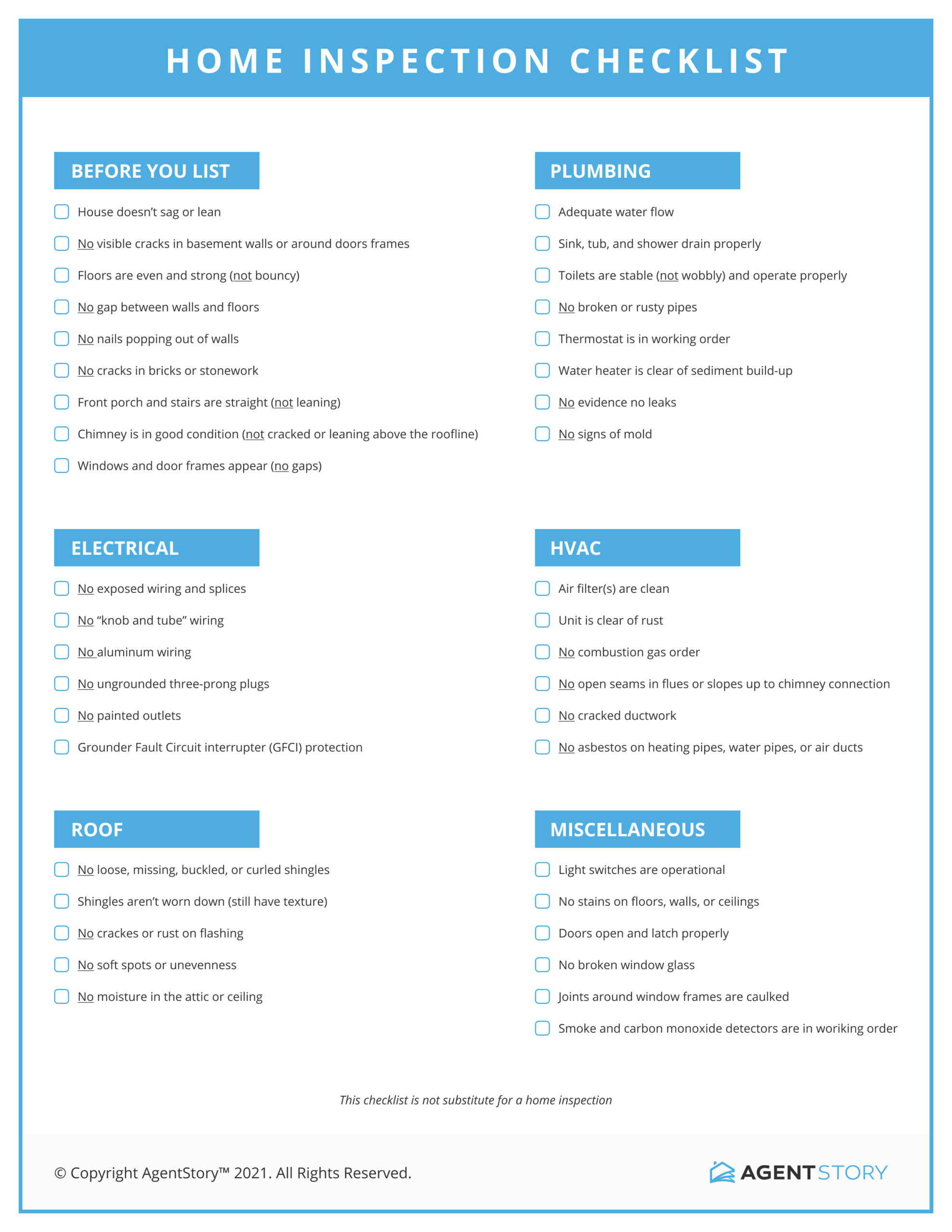Home inspectors aren’t going to slap you with a ruler if your inspection isn’t pretty, but they’ll undoubtedly write about it in the report. Inspectors are educators, telling the buyer important information he or she needs to know before going forward with the home purchase. At times, the inspector might even let the seller in on a few secrets, ones they wish they didn’t know.
These rigorous walkthroughs are essential when determining if a home is safe, mechanically sound, and of no health concern to the incoming party. There’s no pass or fail grade during a home inspection. However, issues that come up have a way of ruining an otherwise seamless real estate transaction.
So, before the home inspector shows up at your front door, here’s what you need to know.
Why Do I Need a Home Inspection?
If you’re selling your house, for the most part, you don’t have a choice in whether you’ll need a home inspection. Traditionally, the buyer will add a contingency before they finalize a sale. In fact, roughly 88% of buyers used a home inspector in their recent purchase.
The benefits of a home inspection are apparent for buyers: safety, negotiation, repairs, and savings. When a buyer makes an offer on your home, buyer’s remorse is a common occurrence. Home inspections give buyers options and can protect them from hefty repair costs.
Home inspections should ring a few alarm bells if you’re the one selling; nobody wants to learn something unpleasant about their home and jeopardize the deal. In hot real estate markets, buyers might even waive their right to inspection. Declining this stressful inspection can make an offer stand out.
What Are the Potential Outcomes of a Home Inspection?
So, how much is riding on getting your house picked apart? Quite a bit, it turns out. It’s hard to imagine anything wrong with your home at first glance. However, a professional is often able to shine a light on current and potential problems.
The ideal situation for sellers is an inspection that amounts to nothing. Without significant issues, the buyer doesn’t have much room to negotiate. However, if there’s something you need to fix, this gives the buyer leverage. If something does show up on the inspection report, buyers can use this information to open up the listing price for negotiations, ask you to make repairs, or walk away entirely.
Which Areas of My Home Will Be Inspected?
An inspector’s purpose is to identify any health, safety, and mechanical issues within the home. These checks don’t concern themselves with cosmetic items like messy paint jobs or worn countertops. Here are the seven main areas of concern for inspectors:
Structural and Foundational Damage
The majority of structural problems come from the movement of your home’s foundation. The movement will stress structural integrity, which can create cracks, shifts, and even cave-ins. In fact, 25% of homes fall victim to some form of structural damage.
Home inspectors will fully check the foundation to ensure stability, as repairs cost thousands of dollars, plenty of time, and a considerable headache for the current homeowner.
Water Damage
Liquids infiltrate and weaken the sturdiest of homes. Inspectors are mindful about ceilings that sag, warps in the flooring, mold growth, and foundational issues caused by wood rot and drywall swelling. All of these will be on their list as they move through your home looking for water damage caused by culprits like weathered roofing, faulty stucco, and leaky pipes.
Plumbing Issues
Speaking of leaky pipes, the plumbing in a household is a hot topic for home inspectors. A thorough check of all sinks, faucets, and showers is on the list. They’ll ensure all systems are functioning correctly.
Inspectors are not professional plumbers, and many don’t have the credentials to inspect septic systems, under sink piping, and swimming pools.
Insect and Pest Problems
Bugs can cause massive problems for homeowners, but the truth is that inspectors aren’t qualified pest professionals. Yes, they’ll note any glaring pest issues, but they won’t go into depth.
HVAC Functionality
The inspector will check your HVAC functionality to ensure it’s in working order. These systems are often expensive; however, they can last decades with proper maintenance. The inspection will cover the air filters, rusty units, cracked or clogged ductwork, and hazardous insulation containing asbestos.
Roof Damage
Damaged roofing can lead to more roofing damage. The potential outcomes can be disastrous, as water can penetrate unsound shingles, causing problems for homeowners. Home inspectors want to mitigate future risk by ensuring the roof is in good repair. They’ll inspect it for overall wear and tear, cracks, sags, and leaks.
Electrical Concerns
Homeowners fall victim to 51,000 electric fires each year. Besides losing billions of dollars of property, these fires lead to unnecessary injury and even death. The home inspector’s job is to mitigate these risks by conducting a thorough inspection of your home’s electrical system. Common problems they’ll search for include:
Electric Panel Integrity
They’ll ensure the main shutoff switch is present, check for charring, feel for hot breaker switches, and scan for any visible damage.
Ground Fault Circuit Interrupter (GFCI) Protections in Wet Areas
If you have outlets in wet areas like kitchens or bathrooms, an inspector will ensure they have GFCI protection. GFCI outlets detect electrical imbalances and act as an emergency shutoff switch.
Exposed or Aluminum Wires
When wires are openly exposed, you’re asking for trouble. Expect to be scrutinized for dangling or old aluminum wires. Copper wires are more durable than aluminum, which allows them to hold a better current. If an inspector sees aluminum wiring, they will note it in the inspection. Many insurance companies will deny homeowners coverage because aluminum tends to expand and contract—shortening its lifespan.
Overlamping
Overlamping occurs when homeowners use a high-wattage bulb in a lower-wattage fixture. This causes extreme amounts of heat that could potentially spark an electrical fire.
Number of Outlets
Building codes in different cities require a minimum number of outlets on each wall in a home. The inspector will ensure your home is up to code.
How Can I Prepare for a Home Inspection?
Getting ready for a home inspection should start well before you put your house on the market. However, it’s okay if you haven’t made any moves. Grab a checklist and a flashlight and do a mini home inspection to see if you can find any glaring issues. If you have another person with you, it’ll be easier to detect problems. You’re probably too comfortable with your house to conduct an honest inspection. Bring along a friend to hear an unbiased opinion.
Use this checklist to gauge the integrity of your home:

When you complete the checklist, consult with a trusted real estate advisor to go over your options. Some fixes will be easy, such as switching out a light bulb. Others, like foundational issues, will require more manpower.
Homeowners should complete what maintenance they can—following a real estate agent’s counsel—and determine if the larger problems are worth hiring professional help. Some markets are so hot that buyers don’t care if they have to fix the house themselves, but this will often come with a price reduction.
If you purchase anything for the home or hire a professional, keep receipts for your records. Also, consider how you would feel if you were buying a home with several issues. Would that inspire confidence?
Do I Have Other Options?
Fortunately, you do have options as a seller. You could always pay for an inspection before you receive an offer. The average home inspection will cost between $300 to $450 and will likely come out of pocket. You could potentially have two inspections, as it’s usually the lender who requires an inspection from the buyer.
Getting your own inspection is a reliable option for older homes without recent transaction history. Pre-inspections can also relieve stress and take away the element of surprise. When you receive a pre-inspection, you can potentially take a buyer’s bargaining chip off the table.
Remember, if something is found during the pre-inspection, you are still legally required to disclose this information to potential buyers.
The Bottom Line
Undergoing a home inspection is never fun, especially if you’re footing the bill. Most homebuyers (or their lender) will require one before they close on a house—after they’ve made an offer. There’s no quicker way to spoil a deal than a botched home inspection report. And while these aren’t pass or fail tests, buyers who aren’t surprised or disappointed by the home inspection might call off the deal.
If you’d like to get ahead of a home inspection, conduct your own using AgentStory’s checklist and see if you find anything noteworthy. Chat with your real estate agent and voice your concerns. He or she will advise you on the next steps and hopefully negotiate you out of any price drops. If you haven’t listed yet, consider a pre-inspection. These might be a bit spendy, but they can clear the air and give you and the future homeowner peace of mind.










